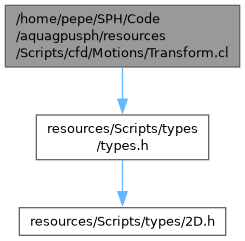Euler-XYZ based transformation script. More...
#include "resources/Scripts/types/types.h"
Functions | |
| __kernel void | entry (const __global uint *iset, const __global int *imove, __global vec *r, __global vec *normal, __global vec *tangent, usize N, unsigned int motion_iset, vec motion_r, vec4 motion_a) |
| Transform the boundaries applying Euler-XYZ motion. | |
Detailed Description
Euler-XYZ based transformation script.
Function Documentation
◆ entry()
| __kernel void entry | ( | const __global uint * | iset, |
| const __global int * | imove, | ||
| __global vec * | r, | ||
| __global vec * | normal, | ||
| __global vec * | tangent, | ||
| usize | N, | ||
| unsigned int | motion_iset, | ||
| vec | motion_r, | ||
| vec4 | motion_a ) |
Transform the boundaries applying Euler-XYZ motion.
Just the position and the normal of the particle are modified, but not the velocity which is changed by MotionVelocity.cl.
In Euler-XYZ the following transformation is applied to a particle \( a \):
\[ R_z \cdot R_y \cdot R_x \cdot \mathbf{x_a} + \mathbf{cor}, \]
where \( \mathbf{cor} \) is the position of the center of rotation (global translations), and \( R_x, R_y, R_z \) are the rotation matrices:
\[ R_x = \left[ \begin{matrix} 1 & 0 & 0 \\ 0 & \mathrm{cos}(\phi) & -\mathrm{sin}(\phi) \\ 0 & \mathrm{sin}(\phi) & \mathrm{cos}(\phi) \\ \end{matrix} \right], \]
\[ R_y = \left[ \begin{matrix} \mathrm{cos}(\theta) & 0 & \mathrm{sin}(\theta) \\ 0 & 1 & 0 \\ -\mathrm{sin}(\theta) & 0 & \mathrm{cos}(\theta) \\ \end{matrix} \right], \]
\[ R_z = \left[ \begin{matrix} \mathrm{cos}(\psi) & -\mathrm{sin}(\psi) & 0 \\ \mathrm{sin}(\psi) & \mathrm{cos}(\psi) & 0 \\ 0 & 0 & 1 \\ \end{matrix} \right]. \]
- Parameters
-
iset Set of particles index. imove Moving flags. - imove > 0 for regular fluid particles.
- imove = 0 for sensors.
- imove < 0 for boundary elements/particles.
r Position \( \mathbf{r} \). normal Normal \( \mathbf{n} \). tangent Tangent \( \mathbf{t} \). N Number of particles. motion_iset Set of particles affected. motion_r Center of rotation. motion_a Rotation angles \( \phi, \theta, \psi \).
- See also
- MotionUnTransform.cl
- MotionVelocity.cl
- MotionAcceleration.cl
Generated by